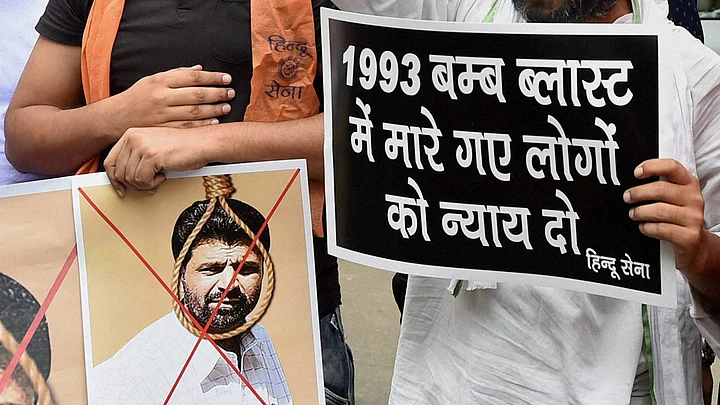Much Ado About Nothing?
- No need for letting a motley crowd of publicity-seekers & paid interlocutors to smell the blood
- The Supreme Court should not allow itself to be subjected to blackmail or threats of referendum on the issue at hand
- Notion that if Yakub’s punishment was not commuted, no source will ever volunteer any information is naive and at best romantic
- Relationship between an agent and his operative lasts as long as it is beneficial to both or either of them
Yakub Memon’s hanging has kicked more dust than a sober assessment of the merit of the case. Living in weird times, we had the unique benefit of coming across bizarre to potentially mischievous reactions, making us wonder whether we were taking our right to freedom for a cruel ride.
Someone in love with his words even went to the extent of equating the poor hangman with Yakub, questioning further the state’s wisdom in acting like a butcher. Anger indeed demonises a man and impairs his judgement. Can anyone suggest a foolproof alternative to end the scourge of terrorism? Until that comes, let the courts and prosecution not hesitate to punish the guilty, matching his guilt.
We also had the misfortune of witnessing an unprecedented midnight coup at the Supreme Court, with judges literally bulldozed by self-professed guardians of ‘dharma’ to have a rethink. Fortunately, the judges held their nerves and shrugged off the peer pressure. Actually, there was no need for letting a motley crowd of publicity-seekers and paid interlocutors to smell the blood.
Judiciary, the Last Frontier
The more you whet their appetite, the more they will demand your pound of flesh. Hopefully, this drama will not be reenacted in future and the Supreme Court will not allow itself to be subjected to blackmail or threats of referendum on the issue at hand. It is our last frontier and we don’t want it to be rendered vulnerable like every other institution in India.
The most baffling development was an attempt to demand overturning the death sentence by claiming that Yakub was promised reprieve by intelligence agencies, should he unravel the conspirators and perpetrators of the 1993 Mumbai serial blasts in which he was also an accomplice. An impression was created that if his punishment was not commuted, no source will ever volunteer any information against fellow conspirators, that it will be impossible to persuade terrorists and militants to betray their associates and that promises of interlocutors from intelligence agencies will carry no weight with criminals who may be thinking of deserting their leadership.
This notion is naive and at best romantic. You cannot win over a source or subvert his loyalty to his country or organisation unless you tempt him by offering something. This could be money and baits in the form of sex, drinks, education for children, good jobs or promises of his political, social and economic rehabilitation in his own country.
Agent-Operative Relationship
This course is routinely followed throughout the world by intelligence agencies but it does not mean that operatives are bound by any convention or statute to fulfil their promises, for they neither have the necessary resources nor any institutional backing. It needs to be clearly understood that the relationship between an agent and his operative lasts as long as it is beneficial to both or either of them.
Similarly, commitments keep changing, depending on how far the agent or the operative is prepared to go to meet the requirement of each other. Who knows which of the promises made by Yakub or his handler fell through and why. No one can ever be sure of its text since it was secretly drawn behind closed doors. Such parleys are never part of any documented proceedings and not meant to be placed before the courts for judicial scrutiny since they are clandestinely carried out.
Evidence Counts
The situation is markedly different when the police, prosecution and the courts view an accused like Yakub. They look at the evidence on the ground in broad daylight, examine them in open surroundings and assess their admissibility and relevance to the crime only as required by legal provisions that are equally available to him and his lawyer.
The courts dispense justice based on considerations that are not perceived but real. An intelligence agency may play a role in apprehending an accused or procuring incriminating evidence through secret means or channels but unless these are openly and independently verifiable, they are of no use to either the prosecution or to the courts. So why fuss over what late B Raman felt?
(The writer if a former Special Secretary, Cabinet Secretariat)
(At The Quint, we question everything. Play an active role in shaping our journalism by becoming a member today.)
